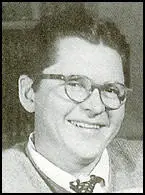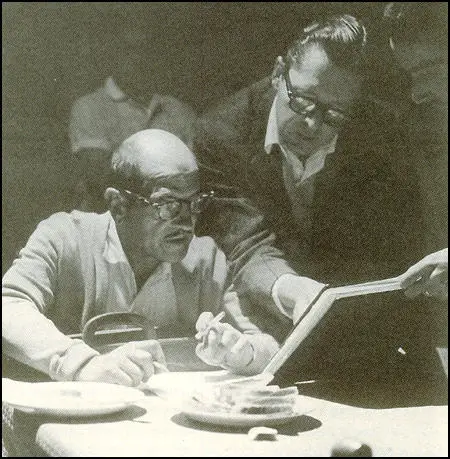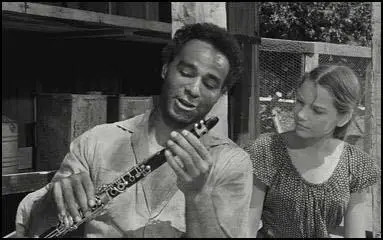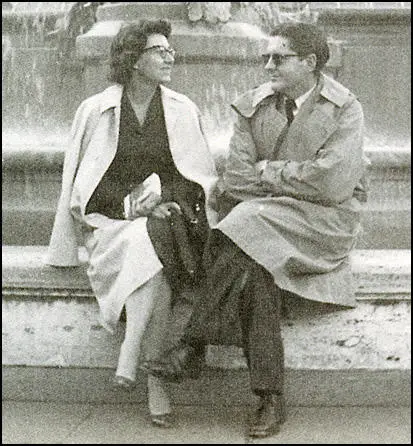Hugo Butler

Hugo D. Butler, the son of Frank Butler, an actor in silent films, was born in Calgary, Canada, on 4th May, 1914. He worked as a journalist before moving to Hollywood in 1937 where he worked on the screenplay of Big City, a film that featured Luise Rainer and Spencer Tracy.
During this period Butler met the actress Jean Rouverol. In her autobiography Refugees from Hollywood (2000) she recalled: "I was quite dazzled by Hugo Butler. He was twenty-two (to my twenty), and he had, I thought, a lovely wit. He also had brown eves that missed nothing; a light sprinkle of freckles; a fresh, almost English complexion and pleasant, even features; reddish brown hair and a sturdy body (well, maybe the tiniest bit overweight), which seemed to me to house delightful high school boy who was still growing up. In a tweed sports jacket, argyle socks, and square-toed brogues and with a faint scent of aftershave, he even dressed enchantingly, I thought And when he phoned me later, offering to drive rue to a party we'd all been invited to, in order to obviate my having to find my own way there, I was convinced. Any young man who used the word obviate in casual conversation was the man for me."
Butler's next screenplay was A Christmas Carol (1938). This was followed by the The Adventures of Huckleberry Finn (1939), Society Lawyer (1939) and Young Tom Edison (1940) that featured Mickey Rooney. His next project, Edison the Man (1940), led to his nomination for the Best Writing, Original Story Academy Award.
In 1940 Butler married Jean Rouverol and during the next few years she gave birth to four children. During this period she performed on radio as Betty Carter on One Man's Family. "For a dozen years or so I'd had a part on a long-running radio serial called One Man's Family - a rambling, lovable piece of Americana that whole families, all over the United States, had grown up listening to." Butler continued to work as a screenwriter and his movies included: Bad Man of Wyoming (1940), Barnacle Bill (1941), Blossoms in the Dust (1941), China Caravan (1942) and The Omaha Trail (1942).
A poll conducted by Fortune Magazine in 1942 found that only 40 percent of the American public opposed socialism, and well over 25 percent supported it, while 35 percent said they had an open mind. According to Lary May, the author of The Big Tomorrow: Hollywood and the Politics of the American Way (2000): "In other words, over 60 percent of the population saw the possibility of socialism as the American Way. Other pollsters showed that majorities also supported the insurgent labor union movement." Butler and his wife shared this radicalism and joined the American Communist Party in 1943. They were recruited by their friend, Waldo Salt. Rouverol argues in her autobiography, Refugees from Hollywood (2000): "And that's how we joined. It wasn't a difficult decision. The political climate encouraged it; the Russians were our gallant allies, suffering terrible casualties but stopping the Germans at Stalingrad. Here at home, the Communist Party was legal; its candidates were on the ballot, and its primary spokesperson was Earl Browder, a gradualist who was saving that perhaps revolution was not inevitable after all, that a peaceful transition to socialism might be possible. But perhaps the most telling reason was that most of our friends were already members."
Butler's next screenplay was Lassie Come Home (1943). According to the authors of Blacklisted: The Film Lover's Guide to the Hollywood Blacklist (2003): "The first and easily the best of the Lassie films, this tear-jerking children's story (brilliantly handled by Butler) is about the sentimental qualities of Lancashire working-class society, the British love and admiration for pet dogs and the extraordinary (if somewhat unbelievable) ability of a collie to travel hundreds of miles, swim rivers, fight evildoers and make her way back to the boy who loves her." This was followed by The Southerner (1945), Miss Susie Slagle's (1946), From This Day Forward (1946), A Woman of Distinction (1950) and He Ran All the Way (1951).
Butler and Jean Rouverol were no longer a member of the American Communist Party but they were worried about the political climate in the United States. In 1947 19 members of the film industry were called to appear before the House of Un-American Activities Committee. This included Herbert Biberman, Alvah Bessie, Lester Cole, Albert Maltz, Adrian Scott, Dalton Trumbo, Edward Dmytryk, Ring Lardner Jr., Samuel Ornitz, John Howard Lawson, Larry Parks, Waldo Salt, Bertolt Brecht, Richard Collins, Gordon Kahn, Robert Rossen, Lewis Milestone and Irving Pichel.
The first ten witnesses called to appear before the HUAAC, Biberman, Bessie, Cole, Maltz, Scott, Trumbo, Dmytryk, Lardner, Ornitz and Lawson, refused to cooperate at the September hearings and were charged with "contempt of Congress". They were all found guilty and given the maximum sentence of a year in prison. The case went before the Supreme Court in April 1950, but with only Justices Hugo Black and William Douglas dissenting, the sentence was confirmed.
Expected to be called before the House of Un-American Activities Committee Rouverol and Butler decided to flee to Mexico City where they were joined by their friends, Ring Lardner Jr., Dalton Trumbo, John Bright, Albert Maltz, Ian McLellan Hunter and their partners. On Saturday mornings this group and their children used to have picnic lunches and play baseball together. The FBI were spying on them in Mexico and according to declassified reports, the agents believed that these picnics were cover for "Communist meetings." They were later joined by Martha Dodd and Frederick Vanderbilt Field.
Butler worked with another refugee from fascism, the Spanish director, Luis Buñuel, on his film The Adventures of Robinson Crusoe (1954). Rouverol later wrote: "Buñuel was a fascinating figure. A not very tall man with simian arms and shoulders, balding head, and exophthalmic eyes, he was married to a tall, blond, handsome Frenchwoman he'd met during his early filmmaking days in Paris, and as he and Hugo became more immersed in preparations for Crusoe, we went often to Sunday afternoon comidas in their backyard, where Jeanne Buñuel cooked paella over an outdoor stove."

The only person who would give them work as writers in Hollywood was the young film director, Robert Aldrich. This included the writing of Autumn Leaves (1956). According to the authors of Blacklisted: The Film Lover's Guide to the Hollywood Blacklist (2003): "The tale of an aging, unmarried woman (Joan Crawford) who falls in love with a young man (Cliff Robertson) but whose good sense is overcome by his ardor. Beautifully cinematic scenes later become stock film sexuality, including Crawford first afraid to show herself in a bathing suit at the beach, then being pulled joyfully into the waves by Robertson, both surrounded by symbolic explosions of surf."

Butler also worked with Luis Buñuel on The Young One (1959). The film, based on a short story by Peter Matthiessen, tells the story of Traver (Bernie Hamilton), a black jazz musician, accused by a white woman of rape while living in the Deep South. Afraid of being lynched he escapes to an island inhabited by the bee keeper Miller (Zachary Scott) and Evalyn (Key Meersman), the granddaughter of his recently deceased partner. The film follows the struggle between Traver and Miller over the affections of the young Evalyn. Whereas she is disgusted by Miller's advances, she becomes increasingly fascinated by Traver.

In 1960 Rouverol and Hugo Butler moved to Rome where he was working on a script for the director, Robert Aldrich, that was eventually filmed as Sodom and Gommah! (1962). Soon afterwards Butler was diagnosed as suffering from arteriosclerotic brain disease. As Rouverol pointed out: "His dementia, finally diagnosed (wrongly) as Alzheimer's disease, became painfully apparent not long after we moved back to the States in late 1964."
Hugo Butler died of a massive heart attack on 7th January 1968.
Primary Sources
(1) Jean Rouverol, Refugees from Hollywood (2000)
I was quite dazzled by Hugo Butler. He was twenty-two (to my twenty), and he had, I thought, a lovely wit. He also had brown eves that missed nothing; a light sprinkle of freckles; a fresh, almost English complexion and pleasant, even features; reddish brown hair and a sturdy body (well, maybe the tiniest bit overweight), which seemed to me to house delightful high school boy who was still growing up. In a tweed sports jacket, argyle socks, and square-toed brogues and with a faint scent of aftershave, he even dressed enchantingly, I thought And when he phoned me later, offering to drive rue to a party we'd all been invited to, in order to "obviate" my having to find my own way there, I was convinced. Any young man who used the word obviate in casual conversation was the man for me.
In any event, as I spoke of mv brief fling with the Left at the table that day in the busy commissary, it was regarded by all of us as an amusing vagary, merely a distraction from the more serious business of getting on with our lives.
Not for long, though.
By the time we had courted, married, and were living in our own tiny Hollywood apartment - and oh, how wonderful it was to be grown-up, working, free of one's mother, and utterly, wildly in love with one's husband! - the post-Depression years and the rise of Fascism in Europe had the film industry in a ferment. Stirred by Steinbeck's Grapes of Wrath, we had become interested in the plight of California's migrant workers, which local left-wingers (among others) were trying to alleviate.
(2) Jean Rouverol, Refugees from Hollywood (2000)
We were both living as normal a life as people can in wartime, working, watching our children become delightful, idiosyncratic human beings when Waldo Salt dropped by one afternoon with his invitation to join the party. And before the next day was out, bingo had said to me, almost casually, "Honey I thought I'd give Waldo the nod. Okay".
And that's how we joined. It wasn't a difficult decision. The political climate encouraged it; the Russians were our gallant allies, suffering terrible casualties but stopping the Germans at Stalingrad. Here at home, the Communist Party was legal; its candidates were on the ballot, and its primary spokesperson was Earl Browder, a gradualist who was saving that perhaps revolution was not inevitable after all, that a peaceful transition to socialism might be possible. But perhaps the most telling reason was that most of our friends were already members.
For me, a joiner by nature, those once-or twice-a-month meetings at someone's house, with eight or ten friends sitting about a living room, fueled by coffee and Danish and discussing dialectical materialism, were an intriguing experience. It wasn't just a political commitment we'd made, I found; we had also committed ourselves to a fellowship, to a group of people we loved and respected. (I remember an old-time member, an aging character actress, telling me: "You always love your first group.")
In spite of my deep affection for my "group," however - a motley assortment of publicists, screen-story analysts, character actors, a teacher or two, a sprinkling of not terribly prosperous doctors and dentists, and an assortment of left-wing wives either with or without careers of their own -I was sharply aware that the group lingo had been assigned to, almost entirely male and made up of fairly prominent screenwriters, With a sprinkling of producers and a couple of directors, which met in Beverly Hills, was in career terms a far more prestigious one. I wondered who made these assignments and on what basis.
